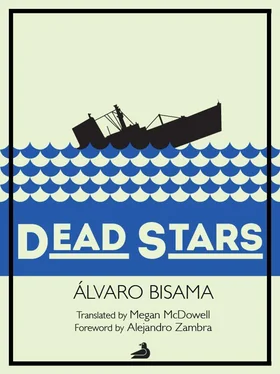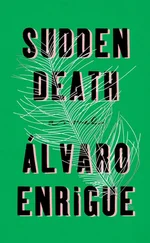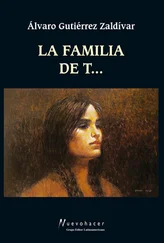The past is always a newspaper page left behind on the ground, she said.
She said: But then something happened. While I was hugging Luisa, we heard noises coming from the men's bathroom. Shouts. We heard something break. A mirror. A woman's voice screeching: Let him go, you asshole, let him go! Then more voices. Let him go, man, you're going to kill him. Let him go. Luisa stopped crying. I got up from the floor. There was a cumbia song playing. We walked out of the women's bathroom. The door to the men's room was across the hall. The paper with the photo of Charly Alberti's wedding stayed behind on the floor. At that moment several guys shoved Donoso out of the bathroom. He fought back, legs kicking. His shirt was torn. They threw him to the ground in the middle of the dance floor. They kicked him. We watched as they carried him to the door and threw him down the stairs. The cumbia never stopped. And then they finally played Soda Stereo. It all lasted one minute, two minutes, she said. It lasted for half of one song. We couldn't do anything, say anything. Then, Javiera came running from the bathroom. She followed Donoso out. She didn't see us. We stood there, paralyzed. Then, the same guys who had kicked Donoso out went back to the bathroom and hauled out a guy, unconscious, his face covered in blood; it seemed like he was someone important. I'd seen him around campus. He was always surrounded by members of the Youth League, and he always sat in front at the events they held in the quad. He never spoke. The others conferred with him in whispers. But now the same people who talked to him in whispers were carrying him like a sack. His mouth was destroyed. I think he was missing teeth. I guess those teeth were scattered around the bathroom and covered in urine, dirty water, and blood, she said. And the guy wasn't responding. I guess they put him in a taxi and took him to the hospital. Luisa didn't say anything. I remember the two of us just stood there outside that bathroom, staring at the tiles. More than the wounds or the guy's face, I remember those tiles, just that: the dragons drawn in black and white on the floor. Those tiles were worn out, chipped by the passage of time, cracked. The bathroom at my house had similar ones. I dreamed about those dragons for a week. Finally I said: What happened? I don't know, Luisa answered.
But I do know. What happened was that everything went to shit, she said. I said: It's a law of nature. When everything goes to shit, someone's teeth wind up on a bathroom floor. There's no turning back. No turning back.
On Monday, neither Donoso nor Javiera went to class. We didn't see them for a week. The rumor was that Javiera had kissed that guy on the dance floor. The rumor was that they had gone to the men's room together. Rumor was that Donoso followed them. Rumor was that Javiera and Donoso had had a fight that afternoon. Rumor was that they had broken up. Rumor was that she and the guy had been smoking marijuana. Rumor was that it wasn't marijuana, they were doing cocaine. Rumor was that they weren't just kissing, they were in the stall screwing standing up. Rumor was that Donoso went into the bathroom drunk and grabbed the guy by the lapels of his jacket and threw him against the mirror. Rumor was that he broke the guy's face against the sink. Rumor was that he didn't say anything to the guy, and Javiera couldn't stop him. That the violence was soundless and had to do with the straight pisco. El trago lo pone mal a uno , as Los Electrodomésticos say, Drink will do you wrong . That's what we heard on Monday, but maybe it was all lies, repeated hearsay, fractured interpretations of events that very well may not have happened, she said.
Oh, and from one day to the next, Luisa stopped talking to me. Javiera took a semester off so she wouldn't flunk out. Donoso kept on going to classes as always. Alberti got married and lived happily ever after in places unknown.
She said: At the end of that year, I overheard someone in the hallways say that Javiera was pregnant.
I was turning into a punk, she said. Or, I was listening to punk. I don't know why. I listened to bands that sang about the end of the world, about destroying capitalist society. Bands with singers who looked strung out onstage, addicted to who knows what. Bands I listened to on cassette in my room with the headphones turned up all the way so I'd go deaf. Bands I listened to alone, because I'd broken up with that boyfriend I'd been with forever, because I didn't give a shit about university, because things had happened that semester that were more interesting than Javiera and Donoso's issues. Things like I took a high school friend to get an abortion, and sat there in the waiting room looking at back issues of Caras magazine. Things like, I could no longer stand talking to my parents. Things like, I stopped reading books or going to the movies, I would just go straight home from the university and lock myself up as if my body were some kind of trunk with no key. Things I never told you about, because those years of our lives seem like shadows of a place we don't want to visit ever again. That's why I listened to punk, she said. That's why I dreamed every night about the end of civilization, about the extermination of human life, about total anarchy; I dreamed that the port and the hills faded away into absolute darkness. That's what that music made me think about. That's what I imagined, and I thought about the mouth of the guy Donoso had pulverized and I imagined the explanations Javiera must've had to give to the Party; I thought about how one day, as we were leaving class, someone told me that she wasn't a candidate anymore, that the party leadership was wary of her, that she had fallen from grace. But I forgot about all that and devoted myself to listening to punk rock on my walkman while I wandered around downtown Viña, which was packed with Argentine tourists, as if the whole city was nothing more than fake scenery, the set of an old monster movie. That summer, my parents went on vacation and I decided to stay home. I rented movies, but I didn't finish any of them. I had forgotten about the future; the future had run off, it had evaporated. In the mid-nineties in Chile, at the beginning of the era of Frei Junior, with Pinochet still alive, there was no future; everything was stagnation, the boredom of every day the same as the last. And the only thing left to us, left to me, she said, was to anesthetize myself, dope myself up with music played by people so damaged they could only express themselves through noise, people who were nothing but screams, people made of terror, she said. That's what I spent that summer doing, listening to punk and wandering around a city full of foreigners.
And you? she said. What did you do that summer? she asked me. Nothing. Or everything. I drank Tres Palos cognac mixed with Free Cola, I said. I took a pair of old jeans and cut them off and made myself some shorts. I read González Vera, a man who wrote about an empty village called Alhué, I said. I spent entire nights drinking with my friends on the train tracks in my town; it wasn't empty, but it still seemed like Alhué. I wanted to get away from there but I couldn't. I didn't go anywhere. I stayed right there. I played pinball. I watched horror movies. I expected nothing because I myself was nothing, I said.
She said: You know what Donoso did? Donoso did something really heavy metal. He left. He disappeared. He went back to Antofagasta. He couldn't do it anymore. He left Javiera in the apartment and got on a bus heading north. That's what he told me in March. He watched the fireworks in the port and the next day he bought his ticket. He didn't say a word to Javiera. She was two months pregnant, and her sister had come from La Ligua to see her. There was a possibility that her son might come, from Ñuñoa. So Donoso got on a bus and went back to his parents' house. He told me how, on that beat-up old bus, he dreamed he was travelling by plane. He imagined a flight he'd never been on. While he looked out at the dry desert, he tried to pretend he was in the air, and that he could watch from the window as the aircraft banked and one of its wings brushed the surface of the waves leaving a wake of foam on the black water. That was what he remembered most. That aerial image that had never existed. He told me he'd left without warning. That he hadn't left a note. That he hadn't even brought his things with him. He told me he hadn't spoken to Javiera, that he'd stopped calling her, that he thought about her every single minute. He told me his parents hadn't wanted to take him in. His father opened the door, then shut it right away. He stayed at a friend's house. His friend still had the same Metallica posters on the wall that he'd had two years earlier, before Donoso left the city. His mother called him there. They met for lunch in a Chinese restaurant downtown. The heat was unbearable. Donoso missed the weather in Valparaíso. His mother asked him what he wanted. She asked him what he'd been doing with his life. He hadn't called in almost a year. He'd decided to stop when his father had insulted Javiera over the phone. His mother asked if he was still with her. Donoso said no. He said it was over. That it was all finished. She said he could come home again. He accepted. He spent that January and that February sleeping at his parents' house. He tried to read, but couldn't finish anything. The words didn't mean anything to him. He got a job as a clerk in a shop, down by the funeral parlors. When it wasn't too hot, he went to the market at the foot of the hill, on the edge of the pampas, to buy bootleg cassettes. Javiera never once called him. He slept with a classmate from high school after a party. The relationship lasted three days. She ended it. Every day, Donoso would go to work and then return to his parents' house. His mother told him he could start studying again next year. His father didn't speak to him, she said. They would eat in silence, with the television tuned to the news or the radio to a Nueva Ola station. Donoso thought he could get used to that life, she said. He dreamed about moving to the north, about watching his parents grow old, about meeting someone and getting married. He had dismissed the idea of being a father, he had forgotten about the fact that Javiera, in the middle of a fight two weeks before Christmas, had told him she was pregnant. He remembered how she'd thrown it in his face like one more tragedy after what had happened at the party, after the disaster he was making of her life. That's what she told him: You fucked up my life. When he was on the bus, she said, Donoso had sworn he would forget everything, he would erase his time in the port city from his memory. But it hurt too much, he said, I can't forget, I can't close my eyes. He started to miss Javiera. He started to imagine her in the apartment, coming and going from some indeterminate place. He cried alone in his room, he put a pillow over his mouth to drown out his sobs, he ground his teeth. He stopped caring about work. He stopped seeing his friend, the Metallica fan. He stopped listening to his mother; he noticed his father's silences, but instead of feeling tortured, he couldn't have cared less. One night, while his parents were watching the Viña Music Festival on TV, he started packing. At dawn he left the house and took a taxi to the bus terminal. He called his mother from there. He didn't tell me what she said. He waited for the bus that morning. He told me that once he was on the bus, he dreamed about a storm. When he woke up, he saw lightning out the window. He imagined that below him, on the pampa, a million hurricanes were gathering. When he reached the port, he took a local bus up into the hills. She hadn't changed the locks. She wasn't there. He waited for her in the dark. When she arrived, she saw him sitting there in the wicker chair. They embraced in the darkness, she said.
Читать дальше





![Джеймс Чейз - Safer Dead [= Dead Ringer]](/books/430347/dzhejms-chejz-safer-dead-dead-ringer-thumb.webp)






